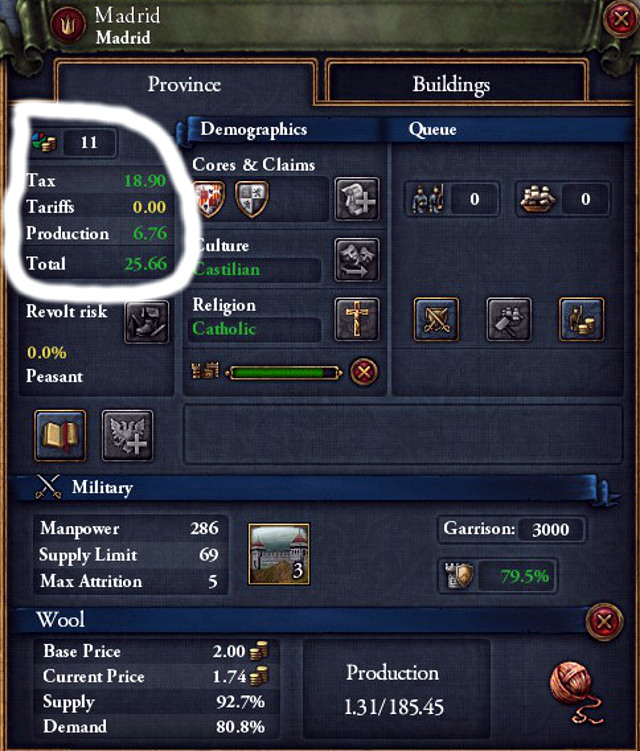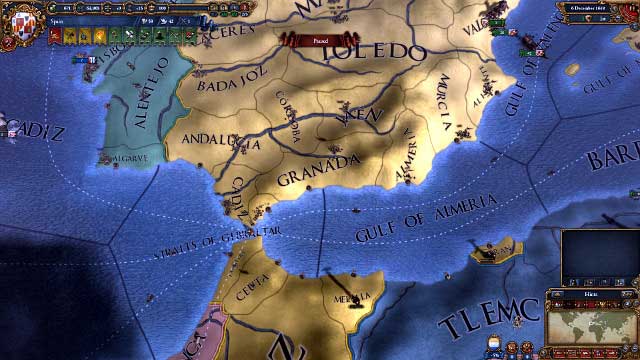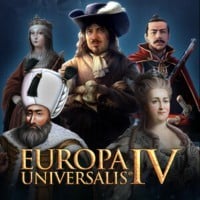Europa Universalis 4: Taxes, production, tariffs

The income generated by provinces is divided into three main types - taxes, production and tariffs.
Tax this is the base amount of income generated by each province. The level of taxation of specified for every province in the world, and it depends on the population, resources and historical conditioning of this area. This base amount is modified by decisions/events, as well as the following:
- Building of a temple+1
- Capital +2
- +0,2 per each one thousand of locals left alive during conversion from colony into a city.
Note that any decisions and various factors inform of the modification of the tax modifier in a positive, or negative way. +10% of the tax modifier, does not mean that the taxes are higher by 10%. The modifier is a multiplier that you multiply by the total of taxes, which you receive as an income, in a given province. I.e. if the taxed amount in a province is 10 (e.g. base 9 and +1 for a temple), and the modifier is 150%, then from this province you will receive 15 ducats.
The modifier is calculated separately for each province. Apart from decisions and events, the modifier depends mainly on:
- Stability (+10% per each positive point);
- Religion (each negative tolerance point equals -10%, furthermore, protestants have +10%);
- Culture (-33% for a foreign culture, -15% for a culture of the same group, but unaccepted);
- Buildings (e.g. constable provides +20%);
- City +25%;
- Core +75%;
- Geographic situation, other provinces on the continent (regardless of the real distance) will have -90%;
- Blockades of ports in wartime;
- Revolt risks.
You necessarily need to note the difference between the values displayed directly in the province window and the values displayed in the budget window. The ones in budget will be far lower than the ones displayed in province. This result from the fact that directly in the province, the annual income from taxes is displayed, with the monthly in the budget, i.e. divided by 12.
Production is an income from selling of the goods produced in a given region. Goods differ between each other and, in general, what is produced, will depend on the income. There is a base value to each one of the goods (2 for regular and 3 for luxury like tobacco or ivory), but it is going to fluctuate depending on the current supply and demand in the world. You calculate this by multiplying the base price by demand and dividing it by supply. Controlling what kind of goods are currently in demand is an easy way to profit, especially if you play in Europe, when the goods in high demand turn out to be the ones produced on a mass scale by a pagan country that you can easily conquer within two months. The production is subject to multiplication with adherence to the same rules as taxes. The modifier can be increased by ideas, decisions, technological development and building.
A specific kind of ware is gold, which does not make it directly into the market, and is worked into direct income instead. Gold is a secure and rich source of quick money but, if it constitutes more than 10% of the country's income, it starts to generate inflation on a regular basis. Detailed information about what is produced in which province is available in the economic mode of the map, and detailed information about specific products and their prices is available in the log (Hotkey - L).

Tariffs - the provinces that are not on the same continent, do not generate production income and their taxes are largely limited (-90%). In exchange for that, the income from these is based on tariffs. Note that there is no difference between the distance of a given area. Each province that is located on a continent different than the capital, which has no direct land connection with it, counts as an overseas colony. The exception to this rule are all the straits, apart from the Strait of Gibraltar. E.g. if you play with Spain and conquer the region right past the strait, just like in the screenshot, this will count as an overseas land. But if you cut through the entire coast of the Mediterranean, all the way to Constantinople, along the northern African coast back to the Strait of Gibraltar, then this land will count as a mainland colony.
How do you calculate customs? By adding the base tax amount to the modified value of trade in that province, and then multiplying it by the base tariff modifier of -85%. There also are several ways to modify the value of tariffs e.g. the abovementioned Spain has a national idea that provides +10%. You can also receive another 20% from the Exploration idea, but you need to remember one thing - all of the positive indicators to tariffs are calculated from a ready value, and not summed up like in the case of tax or production. In simple terms, the idea that adds the 20% will not make the global tariff modifier amount to only -65%. The sum is calculated in a regular way (with the -85% modifier), and the 20% is added to the result, i.e. as a result the difference is minimal. You also need to include the fact that the maintenance of collecting the 100% of tariffs will require a big fleet (roll your mouse over the tariffs in the budget window to see your current effectiveness and how many ships you need more).
In practical terms, tariffs can never be considered the basis for finances and basing on them is not too wise. It is much better to focus on the development on the continent by erecting buildings and developing tax and production ideas. If you have vast lands in the American continent, maybe it is worth considering to relocate the capital, which will carry over production to America, and tariffs to Europe. To relocate the Capital, you need to open the province menu and click on the grey crown next to the name of that province. The cost to relocate is 200 MP.
You are not permitted to copy any image, text or info from this page. This site is not associated with and/or endorsed by the developers and the publishers. All logos and images are copyrighted by their respective owners.
Copyright © 2000 - 2026 Webedia Polska SA for gamepressure.com, unofficial game guides, walkthroughs, secrets, game tips, maps & strategies for top games.
